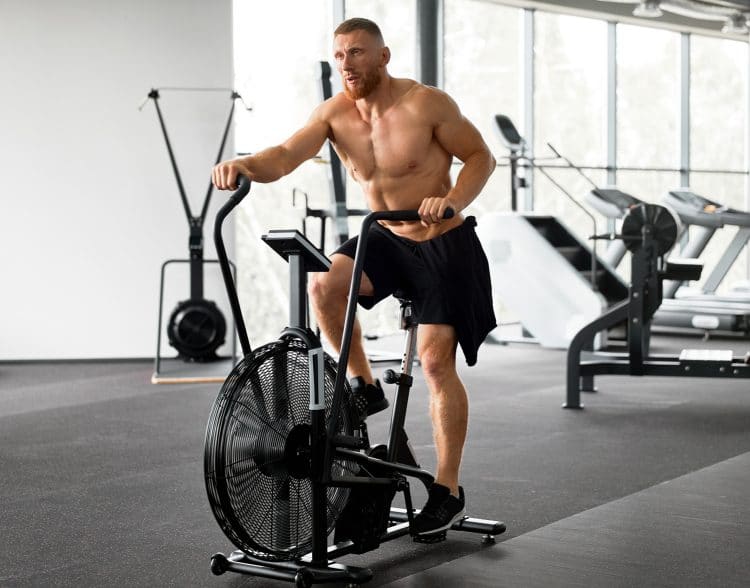Are you tired of being tired after a workout and dread that feeling of exhaustion that hits you like a ton of weights after hitting the gym? You’ve come to the right place.
Many people start exercising because they want to feel energetic and invigorated. However, working out has the exact opposite effect on some. They feel fatigued and drained after a workout and end up dragging their feet through the rest of the day. People that train late in the evening don’t have it any better, either. Exercise fatigue can make it hard to fall asleep.
Furthermore, training fatigue and exhaustion don’t discriminate between beginners and advanced lifters. It can plague the training experience of lifters across all experience levels. Depending on several factors, a lifter might experience fatigue immediately after a workout or the following day.
Chronic fatigue can hamper your ability to recover after a workout, which can impede your strength and muscle gain journey, inhibit your performance in upcoming workouts, and increase your risk of injury.
Contrary to what most lifters have come to believe, post-workout fatigue doesn’t have to be the norm. Making a few changes to your pre-training and post-workout regimen can reduce or even eliminate the feeling of exhaustion and help your body recover more efficiently.
In this article, we cover how to avoid fatigue, the most common reasons for fatigue after a workout, and what you can do to maximize your workout performance while powering up your post-workout recovery. So, put down that Red Bull, and listen up.
Reasons for Fatigue After a Workout
In contrast to the prevailing view held by most lifters, what you do immediately after a workout session is not the only factor responsible for a post-training crash. Multiple factors could be at play if you feel tired and exhausted after a training session. You must analyze your entire lifestyle to check where you are lacking. Here are the factors to consider while troubleshooting your post-exercise fatigue:
Training Intensity

Your training intensity has a significant impact on your post-workout experience. You’re more likely to experience fatigue after a high-intensity training regimen than after a low to moderate-intensity workout. HIIT (high-intensity interval training) workouts involve short bursts of high-intensity exercise followed by brief periods of rest or lower-intensity exercise.
Although the popularity of HIIT workouts is on the rise, only a few trainers know how to program HIIT sessions correctly to maximize results and limit post-training fatigue.
Additionally, lifters that are bumping up their training intensity are at higher odds of experiencing prolonged training fatigue. Trying new exercise programs, lifts, training methods, and advanced training principles can also lead to post-workout exhaustion.
How to avoid exercise fatigue due to high training intensity:
You must gradually increase your training intensity and limit your HIIT workouts to less than 45 minutes to restrict the risk of post-training fatigue. Furthermore, you must cut back your training frequency if you still experience fatigue after lowering your training intensity.
Caffeine

Caffeine, due to its energy, focus, and alertness-boosting capabilities, is the darling of the fitness community. Pre-workout supplements are loaded with caffeine to give you a solid punch of energy. Recently, the sports supplement market has witnessed a flood of energy drinks. Bros that don’t have the budget for a pre-workout supp or energy drinks usually throw down espresso shots to fire up for their training sessions.
However, caffeine is also notorious for causing post-workout crashes. The potency of a caffeine-loaded pre-workout supplement is directly proportional to the harshness of its post-workout crashes.
Plus, caffeine is a diuretic and can cause dehydration if consumed in large quantities, leading to fatigue and decreased athletic performance. It doesn’t end here; consuming too much caffeine can interfere with your sleep cycle, which can add to the feeling of exhaustion and fatigue.
How to avoid exercise fatigue due to caffeine:
If you cannot hit the gym without caffeine, you must regulate your dosage to avoid post-workout crashes. Furthermore, you could use a stim-free pre-workout supplement to get all the benefits of a pre-training sup, minus the crashes.
Dehydration

Proper hydration is crucial for optimal training performance and recovery. During a workout, your body sweats to regulate your body temperature. Dehydration strikes if you don’t drink enough fluids to replace the lost sweat, leading to a decrease in blood volume and blood pressure, which makes it harder for your heart to pump oxygen and nutrients to your muscles.
You’ll fatigue more quickly and often if your muscles don’t get enough oxygen and nutrients during a workout. Muscle cramps and stiffness are a couple of signs of dehydration, which can further lead to chronic fatigue. [1]
Furthermore, dehydration during a workout can cause your core body temperature to rise, which can lead to heat exhaustion or even heat stroke in severe cases.
How to avoid exercise fatigue due to dehydration:
You must keep yourself hydrated before, during, and after a workout. Plus, if you are an endurance athlete or sweat a lot during your training sesh, you must ensure you consume an appropriate amount of sodium and electrolytes to avoid dehydration. Sports drinks such as Gatorade are excellent for keeping you hydrated throughout an intense workout.
You must drink at least a gallon of water each day to keep yourself hydrated and limit the risk of dehydration. The American Council on Exercise recommends drinking 17-20 ounces of water 2-3 hours before exercise, 7-10 ounces every 10-20 minutes during exercise, and at least eight ounces of water within 30 minutes of exercise.
Low Blood Sugar

Your body uses stored glycogen as an energy source during your workouts. People following a calorie-restrictive diet are at a higher risk of exhausting their glycogen reserves during moderate to high-intensity workouts, which can cause low blood sugar and fatigue.
If your blood sugar levels drop too low, your body becomes incapable of producing enough glucose to fuel your muscles properly, leading to fatigue. Plus, low blood sugar can lower your insulin levels, reducing your ability to store glycogen. It leads to your muscles tiring more quickly during exercise, leading to fatigue.
How to avoid exercise fatigue due to low blood sugar:
Eat balanced meals before and after a workout to limit the risk of low blood sugar levels. The meals should contain high-quality complex carbohydrates to replenish your glycogen reserves and avoid fatigue. Additionally, you must eat a carbohydrate-rich snack during longer workouts to prevent low blood sugar.
Lack of Sleep

A lack of sleep can make you feel tired and lethargic, especially after a high-intensity workout. Many people get grumpy after a bad night’s sleep, which can hamper the quality of their workouts.
You must sleep seven to eight hours each night to ensure optimal time to recuperate between workouts. Sleep deprivation can cause overexertion, which can lead to chronic fatigue.
How to avoid exercise fatigue due to lack of sleep:
Sleeping in a cold room can help you doze off quickly and increase the time you spend in deep sleep, which can improve your recovery. You should avoid screens before bedtime and meditate to improve your sleep cycle. Using melatonin and magnesium supplements can also improve your sleep quality.
Poor Nutrition

A poor diet is one of the leading reasons for prolonged fatigue. For optimal functioning, your body requires multiple nutrients, including carbohydrates, proteins, fats, vitamins, and minerals. Not meeting your daily macro and micronutrient goals can lead to fatigue after exercise.
While a lack of carbohydrates can cause fatigue due to glycogen store depletion, protein deficiency can impair muscle growth and recovery. Improper fat intake can cause joint health issues.
How to avoid exercise fatigue due to poor nutrition:
Ensure that you meet your daily caloric needs and follow a macro and micronutrient-balanced diet to promote muscle and strength gain and limit fatigue. Seek expert help if you don’t know how to design a diet program, as it can significantly improve your energy levels.
Overtraining

Pushing too hard in the gym can lead to overtraining. It beats up your central nervous system, which limits your body’s ability to recover from your workouts. Prolonged workouts, using too many advanced training techniques, or increasing your workout volume and intensity disproportionality can lead to overtraining. [2]
Skipping rest days or not allowing your body enough rest between workouts is also a common cause of overtraining. Not only does overtraining cause chronic fatigue, but it also increases your risk of injury.
How to avoid exercise fatigue due to overtraining:
Diet and recovery are just as important as training, if not more. You must back up your workout regimen with a balanced diet and give your muscles enough time to recover between workouts. Lifters following an advanced training program should limit their workouts to five days a week and rest for the remaining two days.
Read also: Overtraining: How Much Exercise Is Too Much?
Medical Conditions
Medical conditions such as anemia, thyroid disorders, and chronic fatigue syndrome can lead to persistent fatigue and weakness, even with mild exercise. Furthermore, asthma, or chronic obstructive pulmonary disease (COPD), can cause shortness of breath and fatigue during exercise due to impaired lung function.
On the other hand, certain medications can also cause fatigue and weakness as a side effect. For example, beta-blockers, used to treat hypertension and heart conditions, can cause prolonged fatigue.
How to avoid exercise fatigue due to medical conditions:
You must get a doctor’s clearance before starting training if you are dealing with any medical conditions. Plus, you must also seek medical advice before bumping up your training intensity while on medication.
Tips To Reduce Post-Workout Fatigue
Here are some tips on how to avoid fatigue and exhaustion:
Active Recovery

Most hobbyist exercisers overlook the importance of active recovery in their training regimen. Active recovery after a workout can improve blood flow to your muscles, which can help deliver the necessary nutrients for recovery and limits the chances of fatigue. It also reduces muscle stiffness, lower the chances of delayed onset muscle soreness (DOMS), and lowers stress levels. [3]
Active recovery exercises like light jogging, cycling, rowing, and foam rolling are a must after high-intensity workouts. Your active recovery sessions should last between 20-30 minutes. You could also do stretching, mobility drills, or yoga at this time.
Rehydrate and Refuel
You must supply your muscles with the required nutrients to speed up your recovery process. However, rehydration and refueling should not be limited to post-workout. You must follow a balanced diet program to avoid chronic fatigue.
Reduce Stress
Stress reduction techniques can help reduce post-workout fatigue by calming the nervous system. These techniques can vary depending on an individual’s preferences and lifestyle. Some people might prefer playing video games to lower stress, whereas others might prefer listening to their favorite music.
Other popular stress-reducing techniques include deep breathing exercises, meditation, yoga, massage, or taking a warm bath. These techniques help lower cortisol levels, improve sleep quality, increase mental clarity, and reduce muscle tension. [4]
Listen To Your Body
Every individual is built differently, meaning we react to the same stimulus uniquely. An exerciser can have a higher stress appetite than their training partner. Hence, you must not try to copy other people around you. Follow a personalized diet and training program to achieve your objectives. Furthermore, constantly assess your health markers to ensure optimal recovery and reduce your risk of chronic fatigue.
Wrapping Up
Fatigue is a common occurrence among trainers that hampers performance and results in the gym. Dehydration, poor diet, sleep, low blood sugar levels, and overtraining are some of the common factors behind chronic fatigue.
You can uproot fatigue, improve your recovery, and reduce your risk of injury by using the tips mentioned in this article, including implementing active recovery, rehydrating and refueling, reducing stress, and modifying your training intensity according to your needs. Make sure that you seek medical clearance before starting to exercise if you are dealing with a medical condition. Best of luck!
References
- Edwards AM, Noakes TD. Dehydration: cause of fatigue or sign of pacing in elite soccer? Sports Med. 2009;39(1):1-13. doi: 10.2165/00007256-200939010-00001. PMID: 19093692.
- Kreher JB, Schwartz JB. Overtraining syndrome: a practical guide. Sports Health. 2012 Mar;4(2):128-38. doi: 10.1177/1941738111434406. PMID: 23016079; PMCID: PMC3435910.
- Ortiz RO Jr, Sinclair Elder AJ, Elder CL, Dawes JJ. A Systematic Review on the Effectiveness of Active Recovery Interventions on Athletic Performance of Professional-, Collegiate-, and Competitive-Level Adult Athletes. J Strength Cond Res. 2019 Aug;33(8):2275-2287. doi: 10.1519/JSC.0000000000002589. PMID: 29742750.
- Nag N, Yang X, Jelinek G, Neate S, Simpson-Yap S. Undertaking specific stress-reducing activities are associated with reduced fatigue and depression, and increased mastery, in people with multiple sclerosis. Mult Scler Relat Disord. 2022 Jun;62:103804. doi: 10.1016/j.msard.2022.103804. Epub 2022 Apr 12. PMID: 35461058.
